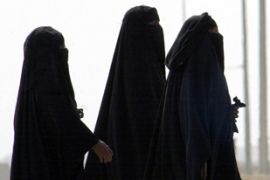Saudi women want end to driving ban
Activists confront driving ban as religious police attacked in separate incident.

Allowing women to get behind the wheel “in accordance with laws and controls to be set by … the Shura [Consultative] Council and the pertinent government parties, has become a necessity at this stage,” the petition read.
It also stresses that Islam does not put constraints such as the driving ban on women and points out that women already “drive in villages and remote rural areas … as do women inside some big residential compounds although there are public means of transport available there.”
Confrontation
On Thursday, two Saudi women called two members of Saudi’s religious police “terrorists” and one sprayed the men with a tearing irritant after they told the women they did not conform to the kingdom’s strict dress code.
The commission employs the police unit that enforces the kingdom’s strict Islamic lifestyle.
The police patrol public places to ensure women are covered and not wearing make up, the sexes don’t mingle, shops close five times a day for Muslim prayers and men go to the mosque and worship.
He said the agents stopped the women to give them “advice and guidance” after they noticed they were wearing makeup.
“One of the women took out a black container and sprayed a tearing substance at them while the other filmed what happened with her phone camera while making improper comments,” al-Marshoud said.
“The women apologised for attacking the two commission members, signed a statement and were released,” he added.
Not equal
In a related development, commission members banned female shoppers from sitting in a makeshift outdoor restaurant to have their fast-breaking meal in a low-income neighbourhood in the western port city of Jeddah because men were already seated at special tables set up for the holy fasting month of Ramadan, according to Al-Watan newspaper.
The paper quoted Muhammed Mehdawi as saying commission members forced his wife and children to eat their food while standing next to him. Other women stood by the stands that run the modest eatery.
Ali al-Luhayyan, head of the commission’s Jeddah branch, said the agents’ actions were meant as a deterrent, “especially since some of the women were dolled up, and also to prevent the mixing of the sexes that could happen at such events and which our religion rejects,” the paper said.
Mohammad al-Zalfa, a member of the all-male Shura Council, sparked a heated debate two years ago when he proposed reforms for women, including a lifting of the ban on women driving.
The advisory body, however, refused to debate the plan.
Although Saudi Arabia has taken small steps toward reform, women were barred from landmark municipal elections in 2005 and remain subject to a host of restrictions.
In November 1990, a group of 47 women defied the ban on driving by roaming the streets of the capital Riyadh in 15 cars. They were swiftly rounded up by police and penalised, while their male guardians were reprimanded.
The following year, a fatwa (religious edict) was issued by Sheikh Abdul Aziz bin Baz, the then mufti of Saudi Arabia and head of the Council of Senior Ulema (Muslim scholars), prohibiting women from driving cars.
The anti-driving ban petition was the brainchild of Oyouni and three other activists – Wajiha Huwaidar, Ibtihal Mubarak and Haifa Usra – who have formed an association for the protection and defence of women’s rights.